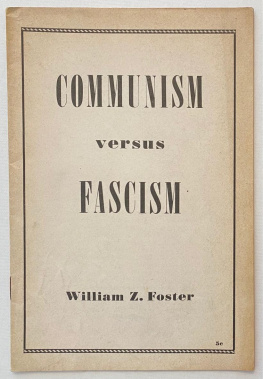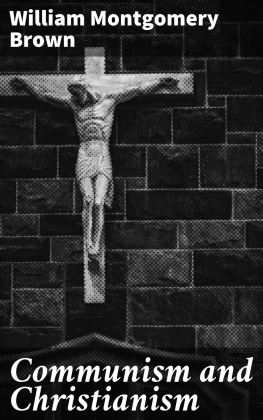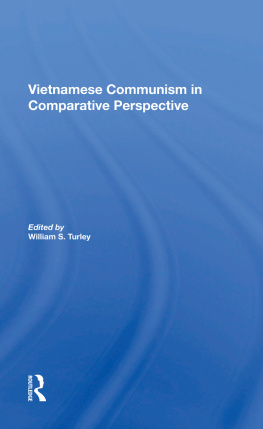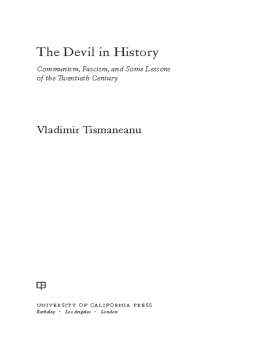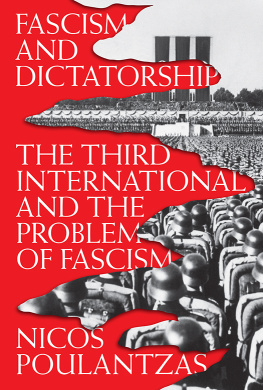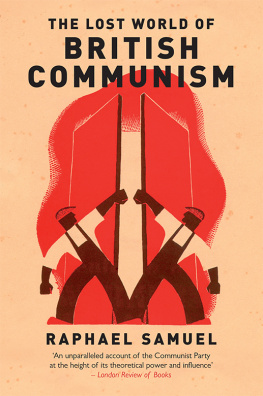William Z. Foster - Communism Versus Fascism
Here you can read online William Z. Foster - Communism Versus Fascism full text of the book (entire story) in english for free. Download pdf and epub, get meaning, cover and reviews about this ebook. City: New York, year: 1941, publisher: Workers Library Publishers, genre: Politics. Description of the work, (preface) as well as reviews are available. Best literature library LitArk.com created for fans of good reading and offers a wide selection of genres:
Romance novel
Science fiction
Adventure
Detective
Science
History
Home and family
Prose
Art
Politics
Computer
Non-fiction
Religion
Business
Children
Humor
Choose a favorite category and find really read worthwhile books. Enjoy immersion in the world of imagination, feel the emotions of the characters or learn something new for yourself, make an fascinating discovery.
- Book:Communism Versus Fascism
- Author:
- Publisher:Workers Library Publishers
- Genre:
- Year:1941
- City:New York
- Rating:3 / 5
- Favourites:Add to favourites
- Your mark:
- 60
- 1
- 2
- 3
- 4
- 5
Communism Versus Fascism: summary, description and annotation
We offer to read an annotation, description, summary or preface (depends on what the author of the book "Communism Versus Fascism" wrote himself). If you haven't found the necessary information about the book — write in the comments, we will try to find it.
Communism Versus Fascism — read online for free the complete book (whole text) full work
Below is the text of the book, divided by pages. System saving the place of the last page read, allows you to conveniently read the book "Communism Versus Fascism" online for free, without having to search again every time where you left off. Put a bookmark, and you can go to the page where you finished reading at any time.
Font size:
Interval:
Bookmark:
In approaching this general question it is necessary to make two definitions. First, the present social order in the U.S.S.R. is not communism, but socialism, which is only the first stage of communism. Hence, instead of the word communism, as applying to the present system in the Soviet Union we will hereinafter use the correct term, socialism. Second, we have to bear definitely in mind that the fascist regime now in effect in Nazi Germany is not a new social order, but capitalism. The real issue, therefore, as presented by the Soviet and Nazi regimes is socialism versus capitalism, and it is in this sense that it is dealt with throughout this pamphlet.
The different social systems of the Soviet Union and Nazi Germany represent the opposite poles of modern society in their economic structure, their forms of political government, their class composition, their foreign policies, their culture and their outlook upon life generally. The socialism of the U.S.S.R. is the beginning of a new world system, whereas Nazi fascism is the most reactionary expression of the dying capitalist world order.
The fundamental difference between socialism and fascism (which is capitalism) is the most significant political fact of our times. This oppositeness in the make-up and policies of the Soviet Union and Nazi Germany (also of fascist Italy), would seem to be so obvious as to be unmistakable. Yet we have witnessed on all sides the fantastic spectacle of a determined attempt to convince the toiling masses in the United States and other capitalist countries that Soviet socialism and Nazi fascism are essentially the same. Some capitalistic writers even insolently assert that Soviet socialism gave birth to fascism. All of which constitutes the most brazen political distortion in history.
The systematic lumping together of Soviet socialism and Nazi fascism as totalitarian dictatorships originates in capitalist circles and is assiduously propagated by their innumerable mouthpieces and agents. Semi-literate poll-tax Congressmen, wise-cracking radio commentators, slippery newspaper columnists, and other spokesmen for capitalism glibly spout forth this grotesque identification of socialism and fascism and with an air of finality as though it were revealed Bible truth. Conservative trade union leaders sing the same song of confusion; similarly various liberal (sic!) scribblers assert that the Soviet Union is a fascist state, and the several brands of Social-Democrats Thomasites, Waldmanites, Trotskyites, etc.
blather about Communazis.
This remarkable ideological campaign to confuse socialism and fascism together under one head has its roots in the capitalists fear for the safety of their world capitalist system, which obviously is in deep crisis. The first and major objective the capitalists and their mouthpieces are aiming at by this campaign is to discredit socialism, which they fear as the nemesis of their own outworn system. Realizing that the masses have a deep hatred of fascism, they try to direct this hatred against the socialist system of the Soviet Union by alleging it to be the same as the fascism of Nazi Germany. The second aim of the capitalists campaign of confusing socialism with fascism is to free their own social system from the stench of fascism. They would have the people believe that Nazism is a reactionary growth independent of capitalism. They argue that Hitlers fascism, so hated by the American people, originated because the capitalist system in Germany was overthrown by a middle class revolution. By this means the capitalists in the United States and other countries hope to hide from the workers and the farmers the fact that the big bankers and industrialists are striving to transform what is left of bourgeois democracy into open reactionary dictatorship according to the Hitler pattern.
The World War II gave a sharp stimulus to the campaign to tar the Soviet Union with the fascist brush. The Hearsts, Peglers, Dennises, Greens, Coughlins, Hillmans, Thomases, Waldmans, Utleys, Coreys, Lovestones, Burnhams and similar elements, who draw their ideology from capitalist sources, are now insisting more stridently than ever that the U.S.S.R., like Nazi Germany, is a fascist, totalitarian state.
These detractors of socialism and defenders of capitalism follow the Hitlerian formula that they can make people believe any lie, provided it is big enough and they keep hammering away at it. For the most part they confine themselves to generalities, reiterating ceaselessly their central theme that Nazi fascism and Soviet socialism are identical. In this pamphlet, therefore, it will be the aim to look beneath these generalities; to make clear to open-minded workers that Nazi fascism is capitalism, rotten and reactionary; and that Soviet socialism is a totally different type of society, healthy and progressive.
Who Owns the Industries?
The foundation difference between socialism and fascism (capitalism) is the fact that in a socialist system the industries and the land are owned collectively by the people; whereas under fascism these social means of production and distribution are owned privately. The widely differing political and cultural superstructures of the two forms of society, as well as their contrary political directions, develop out of their basically different systems of ownership of the industries and the land.
In the Soviet Union, which is a socialist country, the industries and the land are the property of the people, and are operated solely with the objective of improving the peoples condition. There are no private capitalists or landowners whatsoever to exploit the toiling masses. There are neither rich nor destitute in the U.S.S.R. The very essence of the Russian Revolution of 1917 was the transfer of the ownership of the social means of production and distribution from a private to a collective basis by the revolutionary action of the masses, carrying with it the abolition of human exploitation. Section I, Article 4, of the Constitution of the U.S.S.R. states the economic basis of the country as follows:
The socialist system of economy and the socialist ownership of the means and instruments of production firmly established as a result of the abolition of the capitalist system of economy, the abrogation of private ownership of the means and instruments of production and the abolition of the exploitation of man by man, constitute the economic foundation of the U.S.S.R.
Nazi Germany, on the contrary, has a capitalist economy, the same in all fundamentals as that of the United States, England, France and other capitalist countries. The bulk of the wealth of the country is in the hands of a few people. The industries, as before the Hitler regime, remain privately owned. A small clique hold as their personal property the great banks, factories, mines, etc., and systematically use this ownership to rob the German people. In the New Masses, Feb. 11, 1941, G. S. Jackson showed that in the year 1938 the profits of the fifteen largest industrial concerns in Germany averaged 7.7 per cent, as against 5.6 per cent for the fifteen biggest American corporations.
The only important change Hitler brought about regarding the ownership of the industries was to strengthen enormously the position of the great monopolists by more active government intervention in their interest in the shape of state subsidies, favorable taxation, repression of the workers, etc. Now, after the advent of Hitler, the German monopolists far more completely dominate the industries at the expense of the working class, the peasantry, and the small merchants and manufacturers. The land, too, in Nazi Germany is privately owned, with the big landlords steadily increasing their holdings and power. The same general situation exists in Italy. Under the Nazi fascist regime in Germany the big business elements in industry (and also in agriculture) are eating up the smaller ones and are securing complete control of the nations economy. Thus the situation in Germany is just the reverse of what it is in the U.S.S.R. There has been no revolution in Germany (or in Italy). Despite all the current allegations of capitalist-minded American politicians, hack newspaper writers, phoney political economists of the Burnham, Thomas, Corey type, and conservative labor leaders to the contrary notwithstanding, Hitler has not collectivized the industries or the land. He has only strengthened the big monopolists. His so called national socialism is only a demagogic lie, designed to deceive the German working class, which has long since lost faith in capitalism and is socialist-minded. The wholly capitalist character of the economy of Nazi Germany was made clear by G. S. Jackson in her above-cited article, from which the following is an excerpt:
Font size:
Interval:
Bookmark:
Similar books «Communism Versus Fascism»
Look at similar books to Communism Versus Fascism. We have selected literature similar in name and meaning in the hope of providing readers with more options to find new, interesting, not yet read works.
Discussion, reviews of the book Communism Versus Fascism and just readers' own opinions. Leave your comments, write what you think about the work, its meaning or the main characters. Specify what exactly you liked and what you didn't like, and why you think so.

